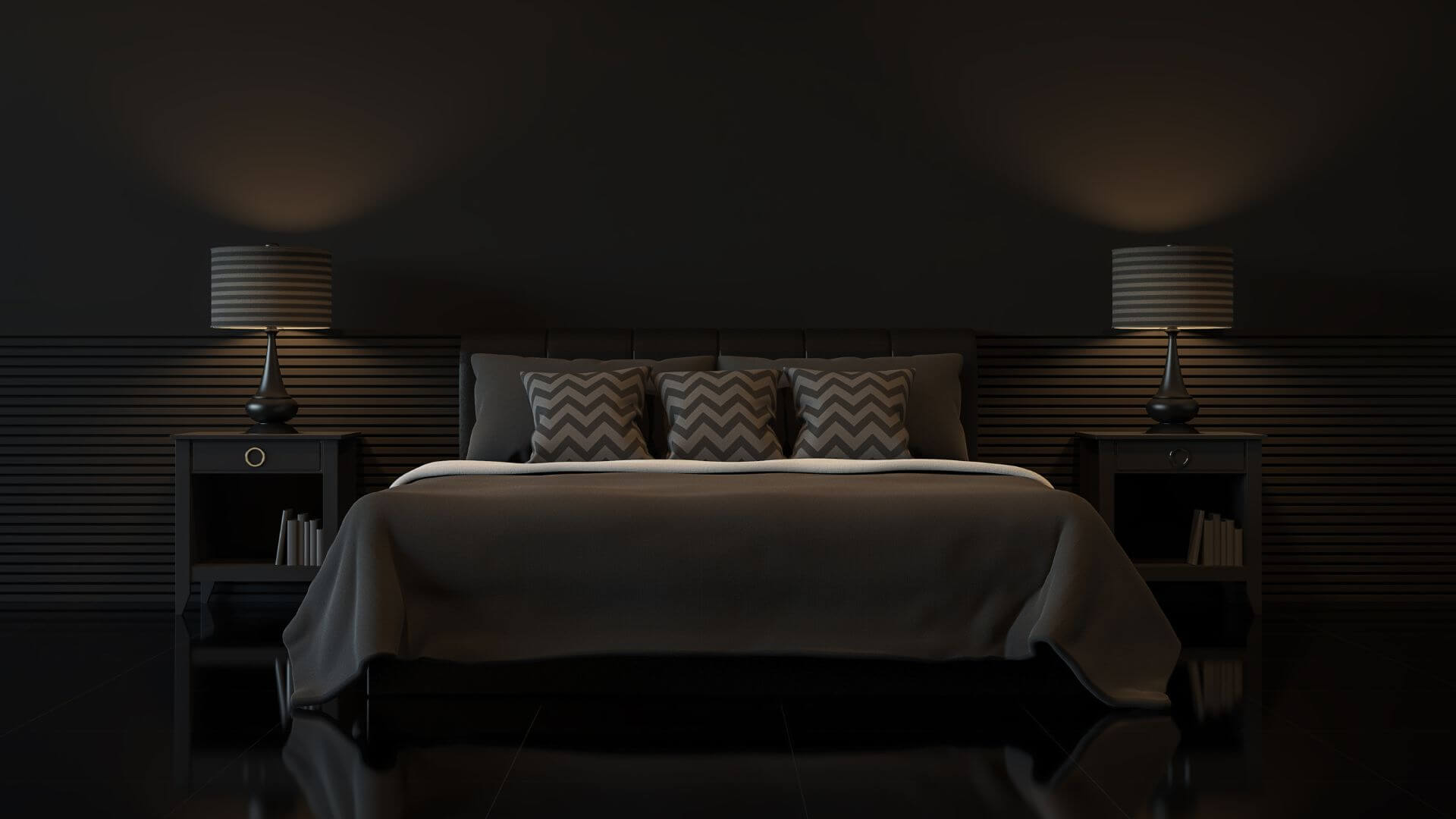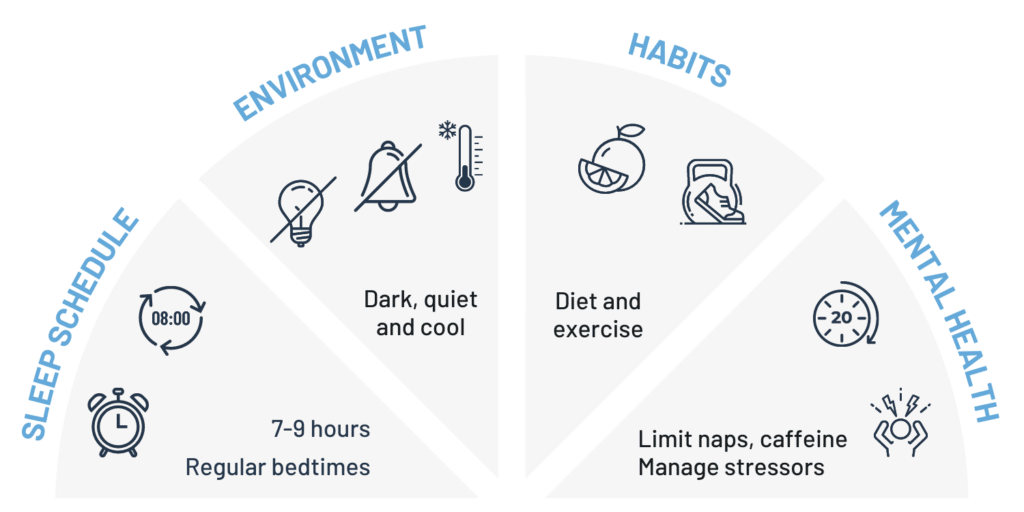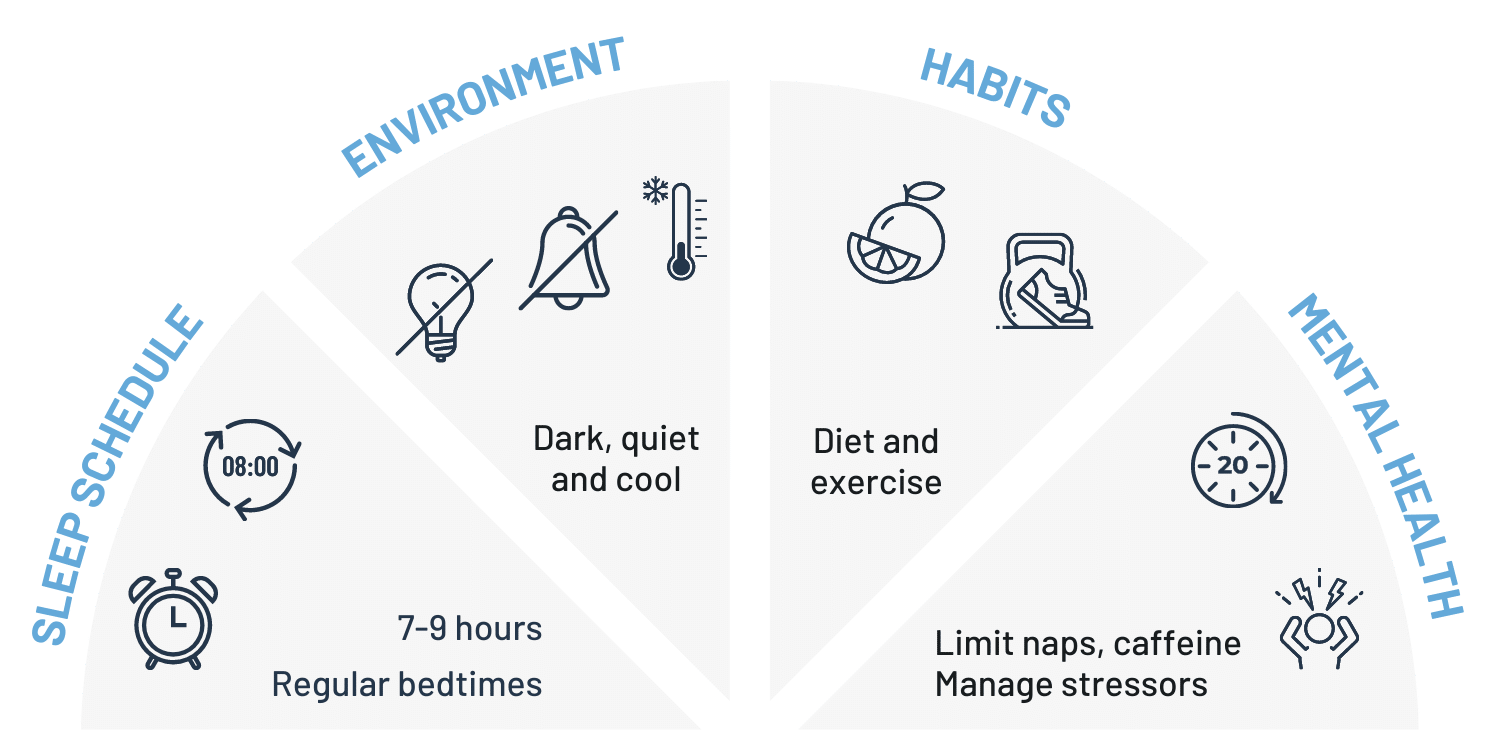
Many Australians struggle to sleep well at night. Helpful tips include: 1. Stick to a schedule, 2. Create a restful environment, 3. Practice healthy habits, 4. Limit naps, 5. Manage worries and stressors. We break down each topic in more detail below.
Stick to a schedule
Establishing a regular sleep schedule is the first step to improving the quality of your sleep. A sleep schedule involves consistent bedtimes — going to bed at the same time every night and waking up at the same time every morning. This will help to regulate your natural sleep cycle or circadian rhythm.
Try to structure your schedule so that you get a sufficient amount of sleep. Most adults require 7 to 9 hours of sleep each night in order to maintain physical and mental health. One method is to start from the time you would normally wake up and count backwards to find an ideal bedtime with enough hours of sleep.
This is not always an easy feat for those who work nights or irregular shifts. For those who fall into this category, we have 10 tips for you to read more about. If you are able to maintain a regular sleep schedule, you will find it easier to fall asleep and wake up at the right time feeling refreshed.

Create a restful environment
A restful night also depends on your bedroom or sleeping space. You ought to have a restful atmosphere that does not distract you or keep you awake.
To create an ideal sleeping environment:
- Keep the room dark
- Aim for a cool temperature
- Minimise noise where possible
- Keep the room free of clutter or mess
There are many quick solutions or items on the market to help facilitate a restful, calming environment. For example, a sound machine or ear plugs may help with noise concerns, or an eye mask may benefit those who need to sleep during the day.
For more tips on creating an ideal sleep environment, please read our guide.

Practice healthy habits
There are several lifestyle changes that can improve the quality of your rest, including diet and exercise. For instance, regular exercise releases endorphins and may help you to fall sleep more quickly. Remember not to exercise too late in the evening, however, as the stimulation may keep you awake.
Your nutrition is an important factor as well. Certain foods (such as spices, excess sugars and saturated fats) can reduce the quality and length of your rest and, in some cases, may wake you up throughout the night. Aim for a healthy diet that is high in fibre and allow enough time to digest your meal before going to bed. Many Australians suffer from heartburn or indigestion as a result of eating shortly before bedtime.
Consuming caffeine or alcohol can also have a detrimental effect. In particular, caffeine acts as a stimulant and its effects may be felt for many hours after consumption. It is best to stop drinking coffee in the early afternoon or at least 6 hours before bedtime. Sources vary on the ideal time of day you ought to have your last cup, but you should generally avoid having any form of caffeine (including some types of tea) in the late afternoon to early evening.
Limit naps during the day
Naps can be a helpful way to restore your energy and concentration throughout the day. A power nap is typically 20 minutes long and is designed to keep you in the lightest stages of sleep.
Though they can be beneficial, it is important to note that naps may disturb your normal sleeping pattern if you take them regularly, or if you nap for too long.
Additionally, taking a nap too late in the day may disrupt your sleeping schedule and keep you up at night. Aim to nap 8 hours or more before bedtime. For many people, this means limiting your naps before 2pm in the afternoon.

Manage worries and stressors
Your mental health plays a large part in the quality and quantity of your sleep. According to the Sleep Health Foundation survey, a significant number of Australian adults experience disturbed sleep as a result of stress (28%) or work-related worries (24%).
Some people find it helpful to establish a pre-bedtime routine that involves relaxing activities. For example, gentle stretching, taking a warm bath or listening to calming music may help to ease you into deeper, easier sleep.
Try not to rely on your devices for relaxation before bed. The blue light emitted from your devices can inhibit your ability to fall asleep naturally. In addition, distressing or emotional content may impact your ability to unwind. If you do need to rely on a device shortly before going to sleep, consider enabling the night-time setting or dark mode option.
FAQs for improved sleep
How can I sleep better at night naturally?
To do this naturally, try to maintain a regular sleep schedule; pay attention to your diet (don’t go to bed too hungry or full); create a restful environment that is cool, dark, and quiet; include physical activity in your day; and try to manage your stress levels.
How do I fix poor sleep?
To fix poor sleep, try to establish good sleep habits. These include a regular sleep schedule, a healthy diet and regular exercise. Create a restful environment that is cool, dark, and quiet and try to manage your stress levels. Always aim for a sufficient amount of sleep each night.
Why can't I sleep even though I'm sleepy?
If you can’t sleep even though you’re sleepy, you may need to change your bedtime routine. Practice healthy habits; avoid food, caffeine and alcohol before bed, limit your naps and try to maintain a regular sleep schedule.
How can I stay asleep for 8 hours?
To stay asleep for 8 hours, try to establish good sleep habits. These include a regular sleep schedule, a healthy diet and regular exercise. Create a restful environment that is cool, dark, and quiet, and try to manage your stress levels.



